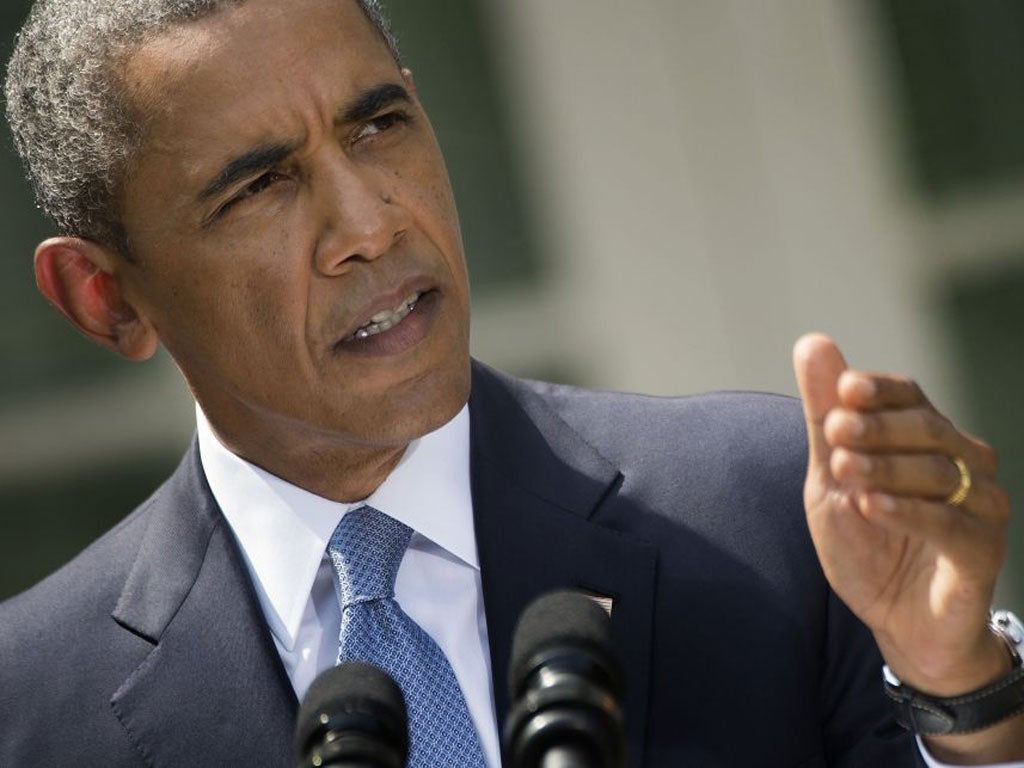Syria crisis: Scepticism greets Barack Obama on both sides of partisan divide
Lawmakers waver as they report very low support among constituents for another Middle East war

Nearly a week into President Barack Obama’s campaign to convince Congress that air strikes against Syria are necessary, he has achieved little headway against a wall of scepticism on Capitol Hill.
The President’s challenge is made more difficult by the fact that the two parties are splintered on the issue – and that lawmakers say they are hearing virtually no support for an attack from their constituents at home.
Republican congressman Justin Amash, an outspoken critic of military hawks within his own party, tweeted on Thursday: “If you’re voting yes on military action in #Syria, might as well start cleaning out your office. Unprecedented level of public opposition.”
Democrats are torn between their fear of crippling a Democratic President with a “no” vote and their anxiety that they might be repeating the mistakes of recent history in the Middle East and Afghanistan.
For Republicans, the debate over striking Syria has reopened a long-standing schism between its internationalist and non-interventionist wings when the party is struggling to reinvent itself. The vote will be a test of some of the party’s possible 2016 presidential contenders, who until now have had the luxury of standing on the sidelines and criticising Mr Obama’s foreign policy.
In the House of Representatives – where prospects for approval appear dimmer than they do in the Senate – the Speaker, John Boehner, and Majority Leader, Eric Cantor, have said they favour strikes but will not pressure other members on what they consider to be a “conscience vote.”
On the Democratic side, “I’m not exactly leading the charge,” the House Minority Leader, Nancy Pelosi, told Time magazine. “But I’m supporting the President.”
On all sides, uncertainty remains over what would be achieved by attacking Syria over its alleged use of chemical weapons. Lawmakers remain unconvinced that limited strikes proposed by Mr Obama would shift the balance in a bloody civil war that appears tipped in favour of President Bashar al-Assad’s government. Or whether that is, in fact, what is desired.
“In order to justify action now … and risk further escalating the conflict, the President must clearly identify what our national security interests are,” said Ileana Ros-Lehtinen, a Republican who heads a House Foreign Affairs Committee panel on the Middle East.
“What are our objectives in limited and targeted air strikes? What does degradation [of the Syrian government forces] look like? And what will we do if the initial action does not yield the intended result?” she asked a hearing with administration officials on Wednesday.
On the same day, the Senate Foreign Relations Committee narrowly approved an authorisation resolution that gives Mr Obama the power to launch a military strike, the first since the 2002 resolution that preceded the Iraq war. The 10-7 vote revealed deep divisions in both parties. Opponents included five Republicans and two of the panel’s most liberal Democrats, Tom Udall and Christopher Murphy. Several Republican establishment figures, including John McCain, sided with the Democratic majority.
After the Cold War, Democrats “coalesced around the use of American power to prevent genocide and other gross violations of human rights,” William Galston, a senior fellow at the Brookings Institution who was an adviser to President Bill Clinton, wrote this week. “But for many of today’s Democrats, Iraq serves as the moral equivalent of Vietnam and evokes comparable doubts about the use of American power.”
Democrats say that Assad’s alleged use of chemical weapons should not go unaddressed, but they are also haunted by the war in Iraq. In 2002, Congress gave President George W Bush broad authority to invade.
The resolution, based on faulty intelligence, opened the door for an unpopular conflict that lasted nearly nine years.
Authorising force: The latest whip count
How members of Congress have indicated they will vote:
Senate
Against military action: 15
Leaning no: 10
Undecided: 52
For military action: 23
House of Representatives
Against military action: 102
Leaning no: 103
Undecided: 143
For military action: 24
Join our commenting forum
Join thought-provoking conversations, follow other Independent readers and see their replies
Comments
Bookmark popover
Removed from bookmarks